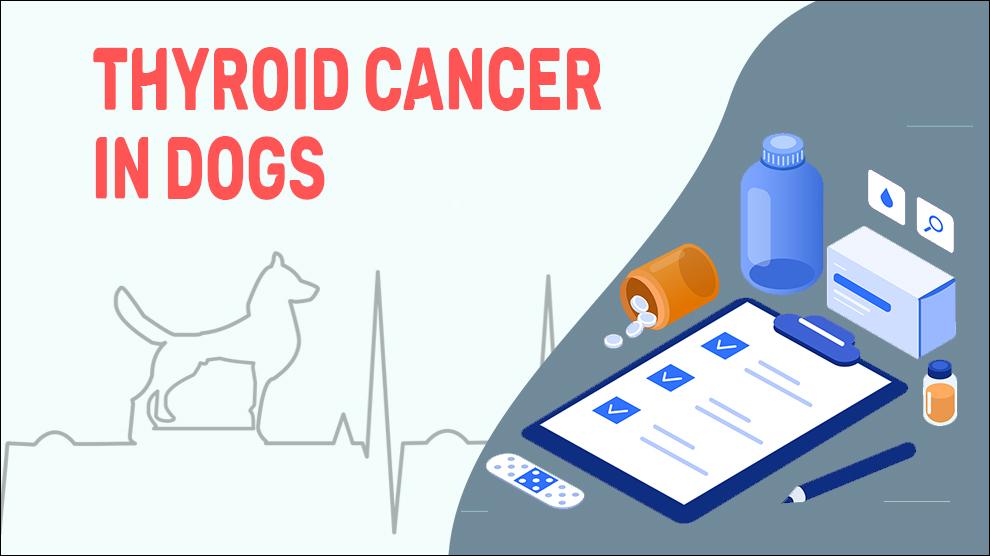What Is Thyroid Cancer In Dogs?
The thyroid gland, a butterfly-shaped gland on either side of the windpipe (Trachea) just caudal to the cricoid cartilage arch about halfway down the neck of dogs. The thyroid hormone, thyroxin is vital for the normal function of the body and it influences hundreds of biological functions.
Thyroid tumors in dogs are rare and only account for 1% - 3% percent of all canine tumors. The median age of dogs diagnosed with thyroid tumors is over 8 years old. Almost 50% of thyroid tumors in dogs are benign adenomas. Most malignant thyroid tumors (carcinomas and Adenocarcinomas) in dogs are non-functional, meaning they do not produce excessive amounts of thyroid hormone (leading to hyperthyroidism), or foil extra thyroxin from being excreted (causing hypothyroidism).
At the time of diagnosis, approximately 35 to 40% of dogs with thyroid tumors will metastasize (spread cancer into other areas of the body) over the course of 1-2 years. Cancer tends to metastasize to the close by lymph nodes first, then the lungs, and so on. The regional lymph nodes (including the cranial cervical, mandibular lymph nodes, and retropharyngeal) are most often affected. Follicular and solid carcinomas have higher metastatic potential than medullary carcinomas.
More than half of the dogs with thyroid cancer will have both thyroid glands affected, with glands malfunctioning in most cases. Almost in 10% of the cases, the tumor will produce additional thyroxin, which can have systemic side effects.
If you notice any lumps in your dog’s throat area and/or your dog’s appetite is good but has weight loss to some extent, take him to the vet clinic at the earliest.
Symptoms Of Thyroid Cancer In Dogs
- Palpable mass on the underside of the neck
- Difficulty swallowing
- Difficulty breathing
- Weight loss
- Polyuria
- Polydipsia
- Hoarseness/change in bark
- Facial swelling
- Hyperexcitability
- Vomiting/Diarrhea
- Dyspnea
Treatment Options For Thyroid Cancer In Dogs
- Thyroid tumors: Chemotherapy and/or radiation therapy will be the initial treatment of choice.
- Dehydrated dogs: Intravenous fluid and nutritional therapy will be given to help your dogs.
Thyroidectomy: Surgical removal of all or part of a dog’s thyroid gland for dogs with less than tumors of <4cm in size and has not spread. Thyroidectomy may be performed for several benign and malignant conditions including obstructive or substernal goiter, hyperthyroidism, thyroid nodules, differentiated (follicular or papillary) thyroid cancer, anaplastic thyroid cancer, medullary thyroid cancer (MTC), and extrathyroidal metastases to the thyroid (lung cancer).
Radioactive iodine (I-131): This can be used in dogs when metastasis has been found after surgery or that are poor surgical candidates or where vascular invasion has been identified. Once taken up by the thyroid gland, radioactive iodine slowly destroys the malignant thyroid tissues. The disadvantages of I-131 therapy are this should be administered in very high doses and hospital staff safety concerns.
Home Remedies For Thyroid Cancer In Dogs
- Avoid using ‘potential’ carcinogens such as Pesticides, chemicals, and other naturally occurring carcinogens in pet-accessible areas.
- Avoid canned or commercial dog foods and choose Home-prepared diets.
- Depending on the severity of the disease, dogs may also require physical therapy.
How To Prevent Thyroid Cancer In Dogs?
- Feed a home-prepared diet of organically produced ingredients
- Pay attention to sudden changes in appetite, bowel habits, and weight
- Avoid exposure to potential carcinogens
- Consider regular vet check-ups
- Consider Spaying or Neutering Your Pet
Affected Dog Breeds Of Thyroid Cancer
Airedale Terrier, Cocker Spaniel, Dachshund, Doberman Pinscher, Miniature Schnauzer, Irish Setter, Large Dog Breeds, Boxer, Beagle, Golden Retriever, Siberian Husky, Middle Age Dogs, Senior Dogs
Causes And Diagnosis For Thyroid Cancer In Dogs
1. Causes:
Congenital/idiopathic
2. Mortality:
The longer the dogs suffer from thyroid cancer, the greater the possibility of an earlier death. Fixed thyroid tumors (not metastasized) is a reported survival rate of 25% 1-year post-surgery. The reported median survival time of radiation therapy is >2 years.
3. Diagnosis:
- Routine hematology, Urinalysis, and Electrolyte tests
- Thyroid function tests to determine a hypothyroid disease or an underactive thyroid
- Thoracic (chest) x-ray to check for metastasis
- Serum bile acids analyze the liver function
- Ultrasound and/or computed tomography (CT)
- Cortisol tests
4. Prognosis:
The etiopathogenesis of thyroid neoplasia in dogs is largely unidentified. Some studies suggest the role of Thyroid-stimulating hormone (TSH). Prognosis depends on the size of the tumor, whether it has metastasized, the invasiveness of the mass, and the presence of hypothyroidism or hyperthyroidism.
When To See A Vet For Thyroid Cancer In Dogs?
When you notice any of these signs, consult with a vet as soon as possible.
- Palpable mass on the underside of the neck
- Difficulty swallowing
- Difficulty breathing
- Weight loss
Food Suggestions For Thyroid Cancer In Dogs
- Diet high in protein, complex carbs, and low fat
- Protein: 40% of daily calorie needs must be from protein sources
- Low-fat meats: Ground beef, skinless chicken breast, lean ground turkey, salmon, organ meats such as lamb liver
- Complex Carbohydrates: Oats (or whole oats), Brown Rice, Potatoes & Sweet Potatoes, Whole corn, corn grits
- Foods with lower (or medium) Glycemic Index and Glycemic Load: Avocado, broccoli, cauliflower, cabbage, butter beans and peas, raw carrots, whole meal bread, kidney beans, lentils, eggplant, and greens
Conclusion
Dogs have the best chance of surviving when thyroid cancer is diagnosed in the initial stages (survival rates can be > 50 percent). For dogs with metastasized thyroid cancer, the long-term prognosis is generally poor, in spite of treatment. Most of the dogs are humanely euthanized.

















